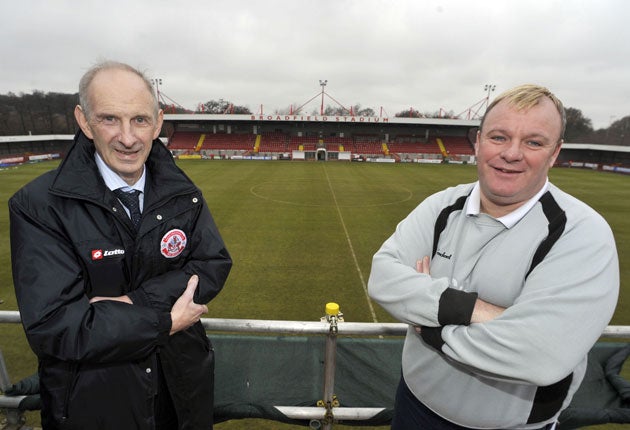'We are Crawley. I don't like the Man City comparisons,' says co-owner

There will not be a snood in sight when Crawley Town host Derby County in the FA Cup third-round tie at Broadfield Stadium tomorrow, and the manager is unlikely to wear an extravagantly knotted club scarf. But the Blue Square Premier club are not known as the "non-League Manchester City" because of fashion accessories.
Like City, Crawley have a spending power that sets them apart from their rivals, although the Reds' backing came not from a foreign investor but locally-based fans. Bruce Winfield, the finance director of marketing services group Media Square, began watching the club 45 years ago after his family moved to the Sussex new town. His co-owner Susan Carter and her husband run an air freight business at nearby Gatwick Airport.
Last year they decided to clear debts of £1 million, securing the future of a club that was losing £400,000 a year and had limped from one crisis to another – administration in 1999 and again in 2006, points deductions and a winding-up order from HMRC.
They also made funds available to Steve Evans, the manager, that were the envy of his rivals. Among 18 arrivals were Matt Tubbs from Salisbury, now top scorer in the Conference with 19 goals, for about £70,000, and Richard Brodie from York, player of the season in the Conference. "Project Promotion" to the Football League is on course, with Crawley tucked in behind AFC Wimbledon, the leaders.
"Two years ago I was introduced to Steve and a few people on the board, and I decided to get involved," Winfield said. "If you'd thought about it for more than five minutes, you wouldn't have done it. There was a lot of debt, the brand was no good, administratively it was a mess. It was a decision of the heart, which is probably the worst decision in business, but we've done pretty well. You could have spent all this money and still been mid-table."
Winfield and Carter kept faith with Evans, who took Boston into the League in 2002 but was banned for 20 months in 2003 for impeding an FA investigation into contract irregularities at Boston and later received a 12-month suspended sentence for his part in a tax fraud.
"He came with a bit of baggage, and his disciplinary record is abysmal, but he's cleared that up," Winfield said. "I don't know what happened at Boston, but we're squeaky-clean. There's a lot of pressure on Steve to go up, but he understands football, has bags of enthusiasm and works hard."
For Evans, the visit of Derby offers a rare opportunity to be the underdog. "We went 1-0 down here [in the Cup second round] against Swindon against the run of play and there were chants from the home end of 'Evans, sort it out' – and we were dominating a League One side," he said. "That tells you the levels of expectation. We are the scalp everyone wants because we're seen as wealthy, but there are players where Bruce and Susan have said the deal was too rich.
"Some clubs talk as if they've hardly got a budget, but we're playing catch-up against Wrexham, Cambridge, Wimbledon. Last season we took cars to away games to save money. Some opponents arrived in a fancy Premier League-level coach. Every fifty pence gets explained here."
Winfield agrees that the care with which money has been spent is key to the club's success, and when he decided "it was too much for Sue and me to run", he used business contacts to attract extra shareholders, including money from the Far East. "I know how to organise money," he said. "We have funds, but we're not sticking in hundreds of millions of pounds. I don't like the Man City comparisons and I'm not Sheikh Mansour.
"People don't usually buy £50,000 players in non-League football. If we want to buy, we pay up front, not over two or three years. We don't owe anything, we budget rigorously, we don't sign 35-year-old ex-League players and we're not paying silly wages. If you want to part with money, football is one of the easiest ways, and some previous owners made a mess of it. We put in more money last year to pay off debts than we've put in this year to pay for players."
So why invest in a local non-League club? "I go back to when the team was part of a community, and you supported your local club. That's gone, hasn't it? Everyone's a Man United or Arsenal supporter, but a football club is important for a town. And I've always preferred non-League football. It's intimate, more pleasant. But if we go up it'll be exciting."
Subscribe to Independent Premium to bookmark this article
Want to bookmark your favourite articles and stories to read or reference later? Start your Independent Premium subscription today.

Join our commenting forum
Join thought-provoking conversations, follow other Independent readers and see their replies